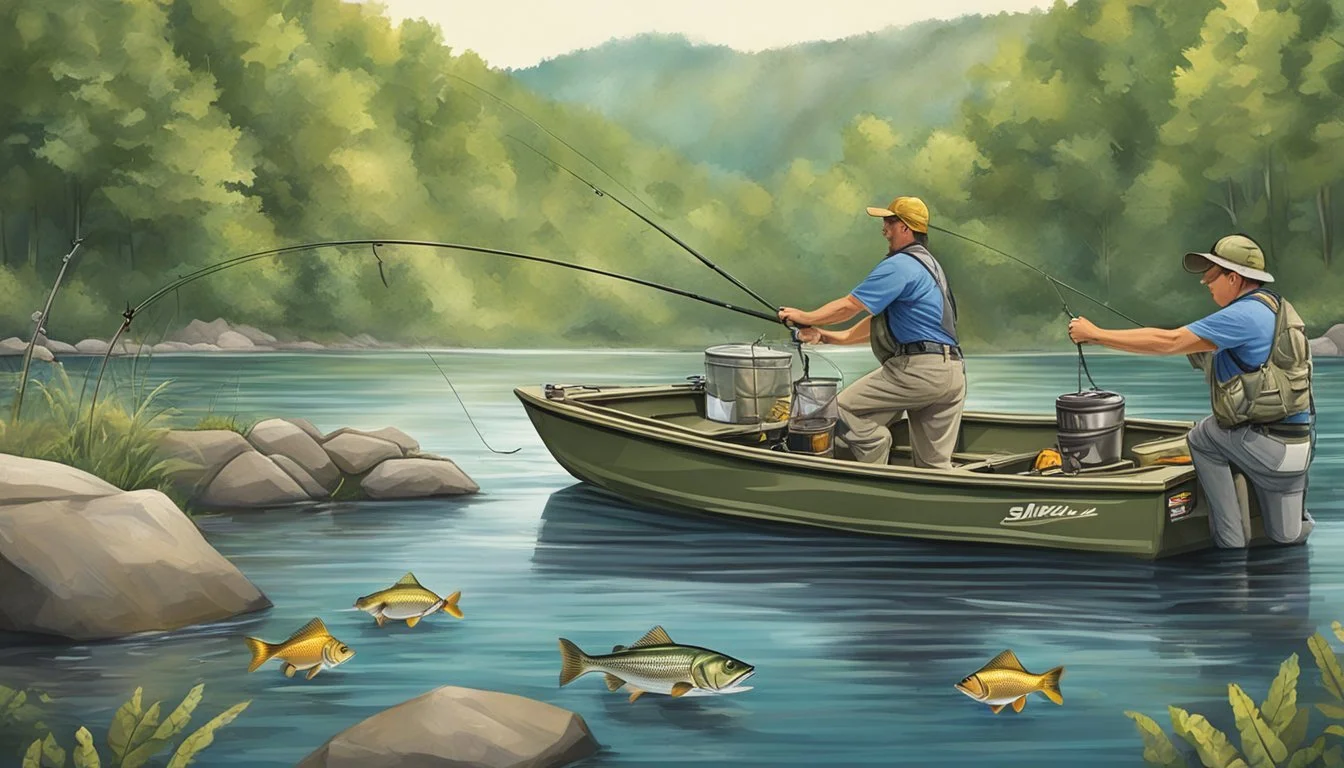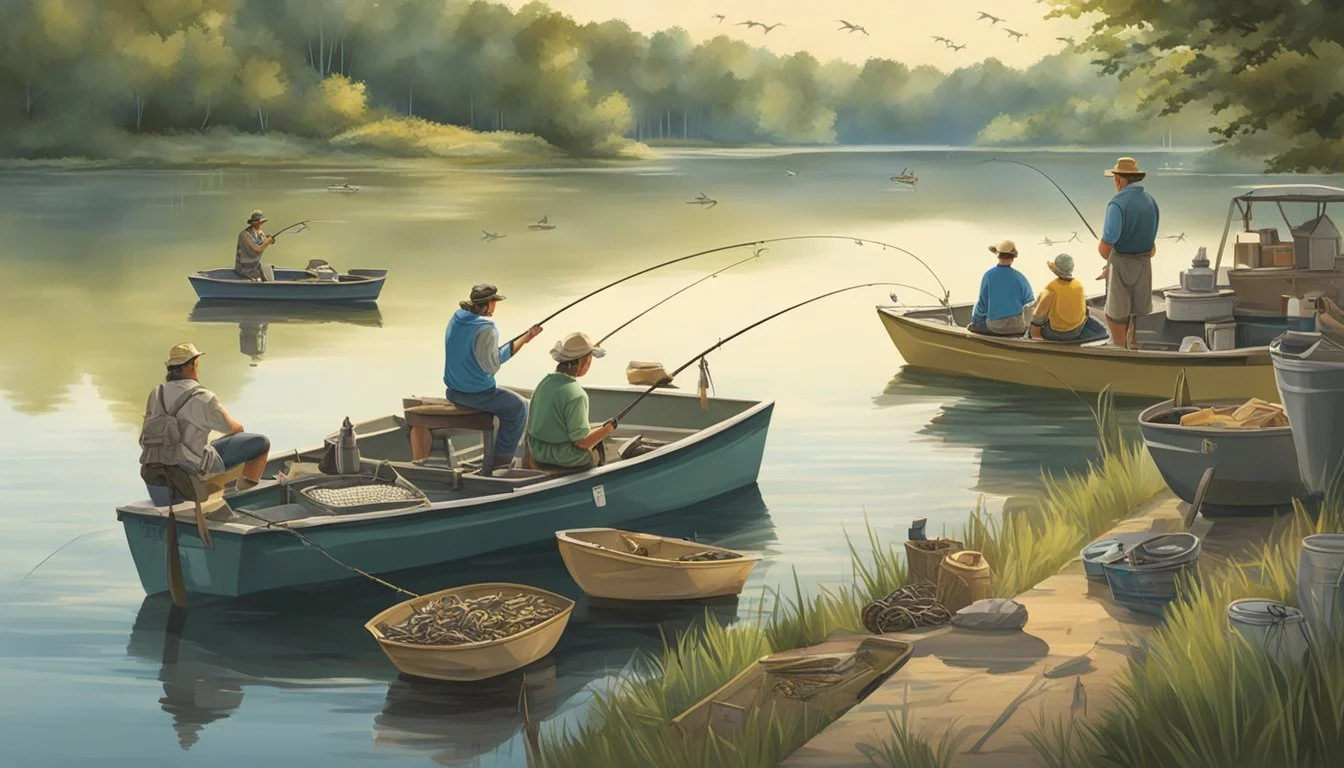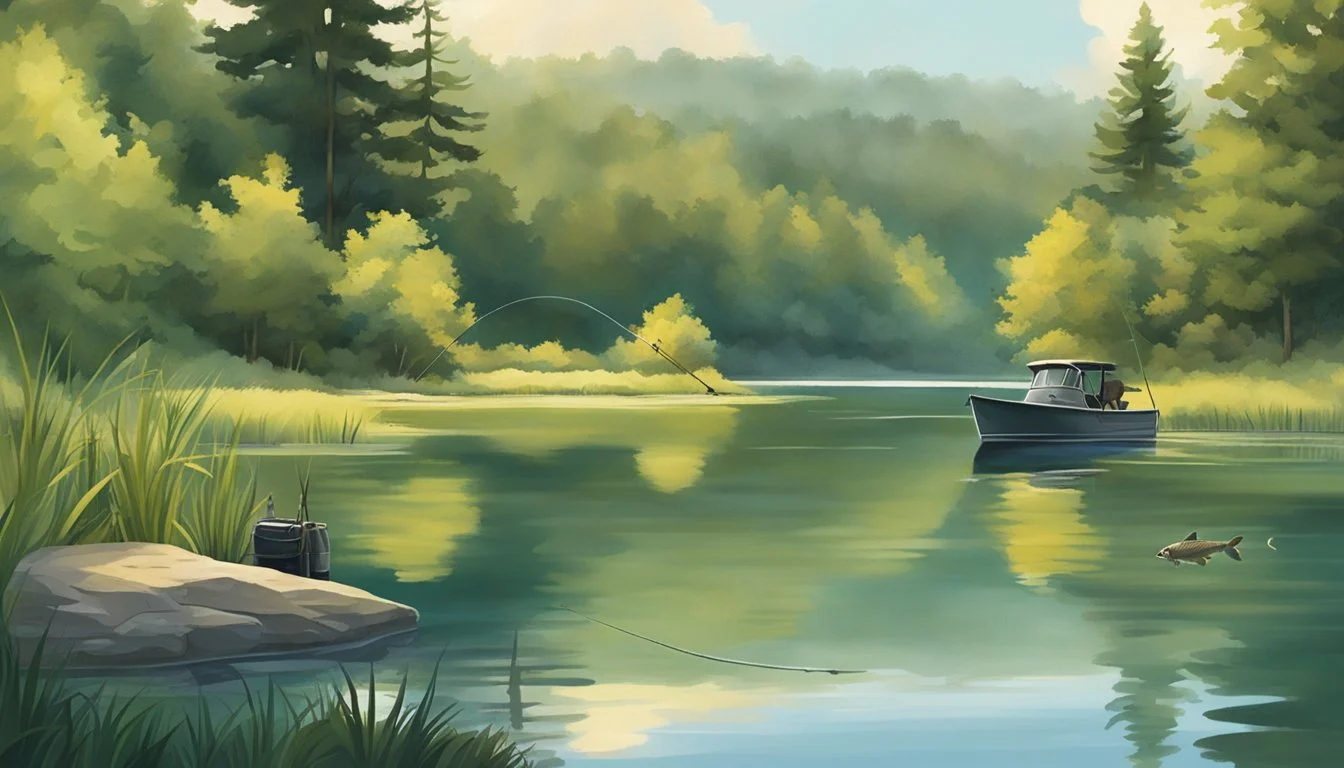Best Fish to Catch and Eat in Tennessee
A Guide to Local Delicacies
Tennessee's diverse aquatic landscapes offer a bounty of fishing opportunities for both casual and avid anglers. With its rich variety of freshwater lakes, rivers, and streams, the state is a haven for those seeking the thrill of the catch as well as the satisfaction of a freshly cooked meal. The waters in Tennessee are teeming with game fish (What wine goes well with fish?), from the powerful largemouth and smallmouth bass to the prized rainbow trout.
The state's reputation for excellent fishing is matched by the quality of fish available for eating. Largemouth bass, found in abundance in Kentucky Lake, are a renowned choice among Tennessee's anglers for both sport and table fare. Meanwhile, Tims Ford Lake is noted for its clear waters and healthy smallmouth bass population, another popular fish not only for its fight but for its savory taste as well.
For those interested in variety, the rivers and lakes of Tennessee house a multitude of species including the delectable white bass and the regional specialty, the black crappie. Each fish offers a unique flavor and texture, tempting anglers with the promise of a delicious end to a day spent amidst the scenic beauty of Tennessee's fishing spots.
Top Game Fish Species in Tennessee
Anglers in Tennessee can enjoy a diverse selection of game fish, offering both plentiful catches and delicious table fare. The following species are celebrated for their abundance and sporting qualities in Tennessee's waterways.
Smallmouth Bass
The Smallmouth Bass is a sought-after species for Tennessee anglers due to its spirited fight when hooked. Found in rocky areas of streams and lakes, the Smallmouth Bass is a top contender for quality freshwater fishing.
Largemouth Bass
Largemouth Bass are prevalent in Tennessee, prized for their size and the challenge they present to anglers. They hold a prominent spot in fishing tournaments, and the Tennessee River is a particularly renowned habitat for these impressive fish.
Catfish
Channel Catfish are a staple in Tennessee's rivers and lakes. They grow to substantial sizes, making them a favorite for both sport and consumption. Anglers often target them for their fighting ability and flavorful meat.
Trout
Rainbow and Brown Trout flourish in the cooler waters of Tennessee. They are frequently found in the state’s clear streams and lakes, providing both a rewarding catch for the angler and a delightful experience for the gourmet.
Crappie
This panfish is well-loved by Tennessee's anglers for its aggressive nature when striking bait and its mild-flavored white meat. (What wine goes well with white meat?) They are often found in large numbers, making Crappie an excellent target for both new and seasoned fishers.
Best Fishing Locations in Tennessee
Tennessee boasts a treasure trove of fishing spots, providing anglers with a diverse array of freshwater fish from its East to West borders. The region is known for its pristine lakes, rivers, and reservoirs that deliver exceptional fishing experiences.
Tennessee River
The Tennessee River carves its path through the state, offering abundant fishing opportunities. Pickwick Lake and Kentucky Lake are noteworthy fishing destinations along this river. Kentucky Lake, one of the country's largest artificial lakes, is heralded for its largemouth and smallmouth bass populations. Pickwick Lake, in contrast, is a prime spot for both bass and catfish, drawing anglers looking for diversity and a challenge.
Pickwick Lake: Largemouth Bass, Catfish
Kentucky Lake: Largemouth Bass, Smallmouth Bass
East Tennessee Lakes and Rivers
In East Tennessee, the scenic beauty and rich waters lure fishing enthusiasts. South Holston Lake stands out with its variety of bass and crappie. Meanwhile, the Cherokee Lake, known for its largemouth bass fishing, and Douglas Lake, a hotspot for crappie and largemouth bass, are popular among anglers.
South Holston Lake: Bass, Crappie
Cherokee Lake: Largemouth Bass
Douglas Lake: Crappie, Largemouth Bass
Middle Tennessee Reservoirs
Middle Tennessee showcases spectacular reservoirs, such as Center Hill Lake and Percy Priest Lake. Both are excellent for catching bass and hold large populations of various fish species. These reservoirs are surrounded by lush landscapes and provide prime fishing spots throughout the year.
Center Hill Lake: Bass
Percy Priest Lake: Various fish species
West Tennessee Water Bodies
West Tennessee's Reelfoot Lake, created by seismic activity, is plentiful in crappie, bass, and catfish, offering a unique natural habitat that enhances the fishing experience. In addition, Gibson County Lake, smaller in size, is another jewel providing excellent largemouth bass fishing.
Reelfoot Lake: Crappie, Bass, Catfish
Gibson County Lake: Largemouth Bass
Lake Barkley, which borders Tennessee and Kentucky, continues the tradition of outstanding fishing with its vast expanse of water peppered with coves and inlets ideal for anglers seeking bass, catfish, and crappie.
Fishing Techniques and Strategies
In Tennessee, anglers tailor their approach to the species they target, often using techniques that cater to the fish's habits and habitats. Whether casting from a boat for bass or wading into streams for trout, the choice of tackle and bait can determine the day's success.
Bass Fishing
For bass fishing, both Striped and Largemouth Bass are popular in Tennessee. Anglers looking to hook these fish should consider the following:
Tackle: A medium-heavy rod paired with a baitcasting reel is ideal for handling the aggressive fight of a bass.
Bait: Artificial lures such as spinnerbaits or plastic worms work well, while live bait like minnows can also be effective.
Pro Tip: Focus on areas with structure such as submerged logs or rock outcroppings, as bass tend to congregate in these spots.
Trout Fishing
When it comes to trout fishing, Tennessee's colder waters provide excellent conditions for species such as Rainbow and Brown Trout.
Tackle: Light to medium rods with spinning or baitcasting reels suited for the sensitivity needed to feel the trout's bite.
Bait: Small spinners, spoons, or trout-specific artificial flies are great choices. Live bait such as worms or insect larvae can also be successful.
Key Locations: Rivers and streams with faster currents and rocky bottoms are typically inhabited by trout.
Fly Fishing
Fly fishing requires a unique set of skills and equipment, and is especially effective for catching trout in Tennessee.
Tackle: A long, flexible fly rod with a matching fly reel and specialized fly line is essential for presenting flies in a natural manner.
Technique: Cast the fly onto the water's surface or just below it, mimicking the movements of insects or small fish.
Table 1: Fly Fishing Equipment Essentials
Item Description Fly Rod A specialized rod designed for casting flies with precision and control. Fly Reel A reel that holds the fly line, typically matched to the weight of the rod. Fly Line Heavy line that delivers the lightweight fly to the target area. Flies Artificial lures that resemble insects, baitfish, or other prey.
By understanding these techniques and strategies, anglers in Tennessee can increase their chances of a successful outing on the water.
Tackle and Bait Selection
Choosing the right tackle and bait is crucial when targeting the popular fish species in Tennessee, such as bass, catfish, trout, and crappie. This section provides specifics on artificial lures and natural baits to help anglers increase their chances of a successful catch.
Artificial Lures
For bass fishing, particularly smallmouth and largemouth bass, anglers find great success with a variety of jigs. Soft plastic worms, spinnerbaits, and crankbaits are effective in mimicking the natural prey of bass. Trout anglers often use small in-line spinners or fly fishing tackle that imitates local insects.
Bass Jigs: Ranging from 1/4 to 1 ounce, equipped with a variety of trailers that resemble crawfish or other small creatures
Spinnerbaits: Often featuring silver or gold blades for maximum reflection in the water
Crankbaits: Designed to dive to different depths, these are useful for locating bass at various levels
Natural Baits
When it comes to catfish, natural baits such as chicken liver, gizzard shad, and nightcrawlers are highly attractive due to their strong scent and taste. Trout respond well to live baits like minnows and insects, while crappie enjoy minnows and small jigs tipped with a piece of worm or insect. Live baits should be kept fresh and properly hooked to ensure they're enticing to the fish.
Catfish Baits:
Chicken Liver: Firmly secured on the hook, leaving a portion hanging to release scent
Gizzard Shad: Cut or whole, depending on the size of catfish targeted
Trout and Crappie Baits:
Minnows: Hooked through the back or lip, presented at various depths
Insects/Crayfish: Match local forage size and color, presented naturally in the current
By utilizing these recommended artificial lures and natural baits with the appropriate tackle, anglers can look forward to productive fishing trips in Tennessee's diverse waters.
Understanding Tennessee's Fishing Regulations
Tennessee offers anglers a diverse range of fishing opportunities, and it is essential they understand the state's regulations to ensure a sustainable and legal fishing experience. Tennessee Wildlife Resources Agency (TWRA) governs fishing regulations to help protect fish populations and provide a fair opportunity for all anglarians.
Key Regulations:
Daily Catch Limits:
Largemouth Bass: A maximum of 10 fish per day, with only two fish permitted over 18 inches.
Smallmouth Bass: Renowned for its popularity, as it is Tennessee's official state fish. Size and creel limits can vary by water body.
Crappie (all species): No specific creel or length limits, but local regulations may apply.
Bluegill/Redear: 10 fish per day, no length restrictions.
Blue/Channel Catfish: Anglers are allowed 5 per day in combination, with a 16" minimum length limit.
Fishing Methods:
Using jug fishing is prohibited in certain areas such as Browns Creek. Anglers should check for local rules regarding allowable fishing methods.Seasonal Restrictions: These may apply to certain fish species or areas to protect spawning fish or reduce fishing pressure during vulnerable periods.
Licenses and Permits: A variety of fishing licenses and permits cater to residents, non-residents, seniors, and those fishing in specific areas like state parks.
Where to Find More Information:
Anglers are encouraged to reference the latest Tennessee Fishing Guide, available both online at the TWRA website and on the TWRA On the Go App. The guide provides comprehensive and up-to-date details on regulations, licensing, fishing methods, and seasonal restrictions.
It's imperative for individuals to verify local regulations, as they may differ from statewide rules. Compliance with Tennessee's fishing regulations ensures a responsible and enjoyable fishing experience for all.
Conservation and Habitat Management
Effective conservation and habitat management are crucial for sustaining the fish populations in Tennessee. These endeavors ensure that freshwater fish thrive in their natural environments, maintain the ecological balance, and support angling activities.
Protecting Waterways
The Tennessee Valley Authority (TVA) plays a vital role in safeguarding the rivers and lakes of the state, managing multiple aspects such as water levels and flow rates which affect fish habitat. In Cherokee National Forest, the strategy includes maintaining the integrity of stream channels and adjacent vegetation. This preservation of natural habitats helps to provide cover and sustenance for various fish species.
Key actions:
Regular monitoring of water quality
Erosion control measures
Riparian buffer zone establishment
Invasive species management
Engaging with local communities on sustainable practices
Maintaining Fisheries
In Tennessee, the focus is not only on conservation but also on the careful management of fish populations themselves. Fisheries are maintained through prudent practices such as timely stocking of hatchery fish and habitat manipulation, which entails the introduction of structures to enhance the natural cover in fishing areas.
Fisheries management involves:
Stocking programs with species like largemouth bass and bluegill
Habitat enhancement using man-made structures
Collaboration between the Tennessee Wildlife Resources Agency (TWRA) and private landowners
Research and implementation of advanced fishery management techniques
Both subsections underscore the necessity of balancing human interests with the well-being of ecosystems to support the health and diversity of Tennessee's freshwater fish populations.
Additional Outdoor Activities
Tennessee’s outdoors extend beyond an angler’s paradise, offering an array of activities that highlight the region's natural beauty and wildlife. Whether you're an ardent wildlife observer or a water recreation enthusiast, you can find your perfect pastime amidst Tennessee's scenic vistas.
Wildlife Observation
The Great Smoky Mountains National Park serves as a natural haven for a diverse ecosystem, where one can observe bald eagles soaring and the elusive brook trout in its streams. Designated picnic areas throughout the park allow visitors to enjoy their surroundings and perhaps catch a glimpse of the Cherokee Nation's storied past. The park’s scenic routes and observation points also offer chances to see bald eagles and other distinctive wildlife in their natural habitat.
Popular Wildlife Sightings
Mammals: Black bears, white-tailed deer
Birds: Wild turkeys, pileated woodpeckers
Fish: Brook trout, blue catfish
Water Recreation
Apart from the prized fishing experience Tennessee lakes and rivers offer, water recreation includes boating, kayaking, and paddleboarding. Reservoirs managed by the Tennessee Valley Authority provide clean and accessible water bodies, ideal for a day of splashing and relaxation. For those interested in a more laid-back experience, tranquil spots for picnicking border lakes where anglers might reel in redear sunfish or carp.
Activities on the Water
Boating and Kayaking
Paddleboarding and Swimming
With a well-rounded variety of outdoor activities, Tennessee caters to the preferences of all visitors looking for adventure or relaxation in the embrace of nature.
Events and Competitions
Tennessee is bustling with fishing events and competitions throughout the year, providing ample opportunities for anglers to showcase their skills. The state hosts a variety of tournaments catering to different species and skill levels.
Bass Fishing Tournaments:
Tennessee Bass Nation: They run events across the state, offering both team and individual competitions.
FLW (Fishing League Worldwide) Series: This series often includes stops in Tennessee, where both largemouth and smallmouth bass are targeted.
Catfish Tournaments:
The Mississippi River Monsters: One of the premier catfish tournaments, attracting anglers who target the largest catfish in the state’s western waters.
Trout Competitions:
There are seasonal trout tournaments, especially in Eastern Tennessee, where the rivers are stocked with various trout species, including the coveted brown trout.
Species-Specific Competitions:
For those looking at niche fishing opportunities, events targeting Crappie and Walleye, as well as children's fishing rodeos, offer a family-friendly atmosphere.
Schedule Overview:
Spring: A popular time for crappie and bass fishing tournaments due to optimal spawning conditions.
Summer: Features competitions that often extend into night fishing, taking advantage of cooler temperatures and active fish.
Fall: Continues to offer bass and crappie tournaments, with the added excitement of striped bass fishing events.
Winter: Though slower, there are still events like the winter muskie fishing tournaments.
Participants should always check for the most up-to-date event schedules and ensure compliance with local fishing regulations and licenses. These competitions not only encourage sportfishing but also emphasize conservation and responsible angling practices.
Local Fishing Culture and Economy
Tennessee's waters host a thriving fishing culture that is both a leisure pursuit and a cornerstone of the local economy. Anglers across the state cherish the abundance of freshwater fish, and fishing-related activities contribute significantly to economic development.
Recreational Fishing:
An estimated one in six Tennesseans engages in fishing activities, with favorites such as largemouth bass and crappie drawing both local and touring anglers. Recreational fishing is a major economic driver, fostering employment in guiding services, retail, and tourism.
Commercial Significance:
Boat Sales and Rentals
Bait and Tackle Shops
Fishing Licenses
Guided Tour Services
Fishing tournaments bolster community engagement, while competitive events can attract nation-wide attention, further injecting vitality into the local economy.
Fishing Regulations:
Limits are set on catches to promote sustainability.
Licenses are required, generating revenue for conservation.
Aquaculture and Fisheries:
Tennessee also supports fishery businesses that cultivate and harvest fish species for consumption, contributing to food supply chains and supporting local jobs.
In conclusion, fishing in Tennessee blends tradition with economic vitality, forming an integral part of the state's identity and livelihood.
Resources for Anglers
Tennessee offers rich resources for both novice and experienced anglers, providing comprehensive guides and educational materials that enhance the fishing experience.
Fishing Guides
Tennessee Fishing Guides: For those seeking expert advice on the best fishing spots and techniques, Tennessee's numerous professional fishing guides are indispensable. They offer customized trips, ensuring that anglers find the best locations for popular species such as Striped Bass and Smallmouth Bass.
Customized Trips: Tailored to individual or group needs.
Expert Advice: Techniques, bait selection, and hotspot identification.
Species-Specific Guidance: Focus on target species for better catch rates.
Educational Material
State Publications and Online Resources: The Tennessee Wildlife Resources Agency (TWRA) offers a wealth of material for anglers:
The Angler’s Guide To Tennessee Fish: A comprehensive overview of fishing regulations, species identification, and habitat information.
Online Articles and PDFs:
Fishing Techniques: Best practices for different types of fish.
Conservation Efforts: Understanding sustainable fishing practices.
With these resources, anglers are well-equipped with the knowledge to enjoy and succeed in Tennessee's diverse fishing venues.







